MOONIE MADNESS
The shooting of ex-PM Shinzo Abe has blown open secret ties between Japan’s ruling party and the mass-marrying Moonies.
Jake Adelstein
Updated Jul. 31, 2022
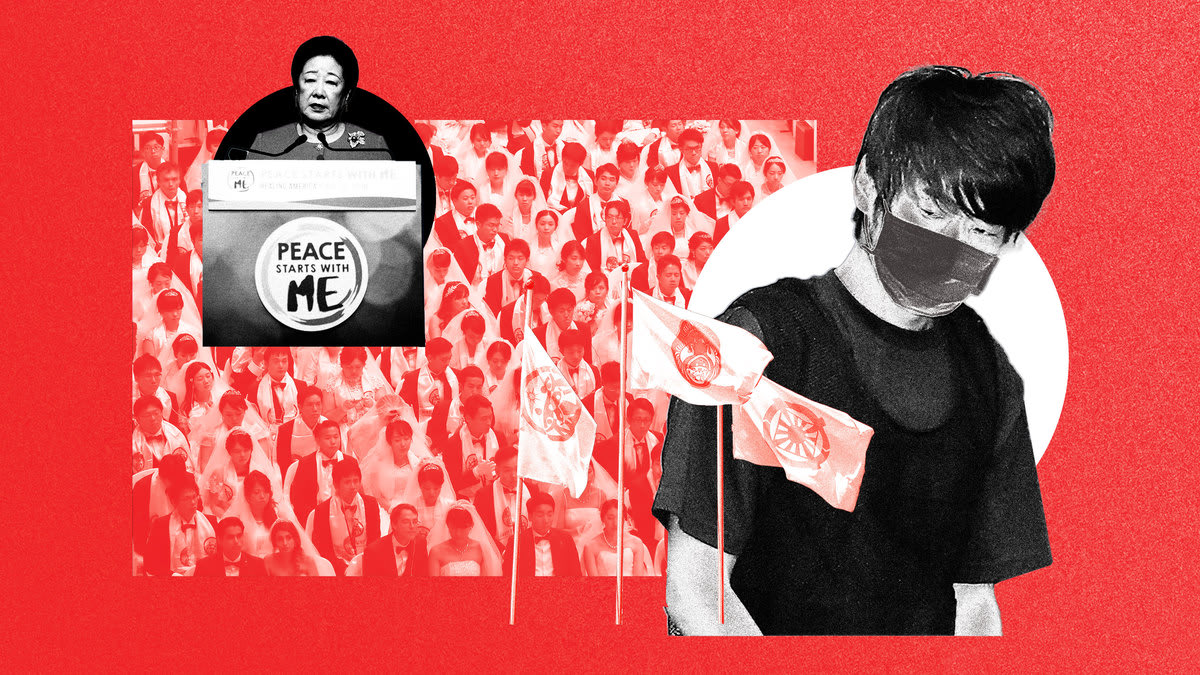
Photo Illustration by Luis G. Rendon/The Daily Beast/Getty
LONG READ
NARA, Japan—The shooting of ex-Prime Minister Shinzo Abe has had unexpected political blowback. The killer attacked Abe not for his political beliefs, but because he wanted to take revenge upon the South Korea-based Unification Church—sometimes labeled a ‘cult’—which he blamed for ruining his family and his life.
Instead of rallying behind Abe, the Japanese people have followed the killer’s wishes and turned their attention to long-standing but little discussed links between the ruling party and the Moonies.
Tetsuya Yamagami told police that he had originally planned to assassinate Hak Ja Han Moon, the head of the church, which is known for holding mass weddings and backing right-wing politicians worldwide, but then decided to target Abe.
Before shooting Abe, he wrote a letter to a freelance journalist—obtained by The Daily Beast—explaining that he murdered Abe in order to expose the deep links between Japan’s ruling party, the Liberal Democratic Party (LDP), and the Unification Church.
If that was his twisted aim, he has succeeded beyond his wildest dreams. The phrase, “After all, the Unification Church and the LDP are one and the same” is now trending in Japan. The Mainichi newspaper ran an editorial on July 27, “The LDP must clean up its ties to the Unification Church.”
The paper wrote, “Why did the Japanese government allow the Unification Church to change its name?… It is only natural that the Diet and the press should try to clarify the actual situation. Above all, the LDP should investigate its long history [with the group] explain it to the public, and liquidate the relationship.”
Not just in print and on the internet but in daily conversations, the Church and the LDP ties keep coming up.
Manabu Yanagi, a retired police detective in Nikko City in Tochigi Prefecture, told The Daily Beast, “The news is shocking. The ties between an anti-social group of fraudsters and the ruling party of Japan are disturbing. It needs to be made clear what exactly those ties were.”
Shinzo Abe Was ‘Trump Before Trump’—Except He Pulled It Off
ONE PARTY MAN
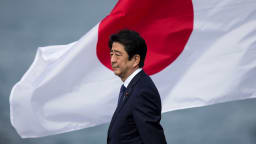
While the Japanese media at first refused to print the name of the cult, they are now going all out—detailing the links between the religious group, Abe, and his party in lurid detail.
The backlash is so strong that many are now openly calling for the cancellation of the State Funeral for Abe that is planned this Autumn. “I oppose the state funeral for Shinzo Abe” was trending on Twitter for a week. A petition opposing taxpayer money being spent on a lavish national funeral for Abe has already gained 67,000 signatures. It points out his connections to the cult as one reason disqualifying him for being honored.
Meet the Unification Church
The Unification Church, which now formally calls itself the Family Federation for World Peace and Unification, has a long history of problematic and “anti-social” activities.
A Korean religious leader going under the name Reverend Sun Myung Moon founded the Unification Church in 1954. According to Moon, Jesus sent him to save families and achieve world peace and fight godless communism. His followers were commonly referred to as “Moonies.” They became known for massive group weddings and various schemes for extorting large financial donations from their members. They were also accused of using brainwashing techniques to recruit and keep adherents.
In Japan, they tapped into ancestor worship traditions and convinced adherents to spend large sums saving their loved ones from hell by buying expensive “spiritual” objects.
They strove to change their image in the late ’80s and ’90s, setting up front companies, think tanks, and related organizations. They have also been media-savvy. Moon founded the conservative Washington Times in May of 1982, and the newspaper is still allegedly tied to the organization, even though Moon died in 2012.
“The heinous act was committed in an attempt to take his revenge on the Church.”
— Professor Koichi Nakano
The Unification Church under various names and guises has not only cultivated strong ties with Japanese politicians, especially the Liberal Democratic Party, but has also managed to forge tight connections to the Republican Party in the U.S., links intensified under President Donald Trump.
One of the sons of Reverend Moon, Hyung Jin “Sean” Moon, created a splinter group, Rod of Iron Ministries, that worships with AR-15s and virulently supports Trump. Sean Moon and congregation members were not only allegedly present at the Jan. 6 insurrection but are seemingly connected to some MAGA megastars. Steve Bannon called into the group’s Freedom Festival last October.
Writing for The Daily Beast, cult expert and former unification church member Steve Hassan explained the religion as follows: “In the Moonies, we were told that we were heavenly soldiers engaged in a great struggle to take the world back from the forces of Satan, which included godless Communism and human-centered Western democracy. Our ultimate goal was to replace these godless human-centered forms of government with a god-centered theocracy, under Moon’s leadership.”
Made In Korea, Sold In Japan
The Unification Church has been wildly successful in Japan and 70 percent or more of its revenue is said to have been derived from Japanese nationals. Billions of yen have been wired from Japan to the church over the last decade, according to an Upper House parliamentarian.
A watchdog group, the National Network of Lawyers Against Spiritual Sales, has been monitoring the Unification Church since the late 1980s. It supports victims of the church and cults. They claimed in a July 12 press conference that the confirmed financial suffering associated with the group up to 2021 exceeded 123.7 billion yen ($899 million). The number represents only a fraction of the whole, they say. The Network representatives also noted that between 2005 and 2010, the Japanese police handled 13 criminal cases of selling goods in connection with the solicitation of donations, involving the church, and that more than 30 Unification Church members were arrested and detained. Numerous lawsuits against the church resulted in damages being paid to victims of predatory practices.
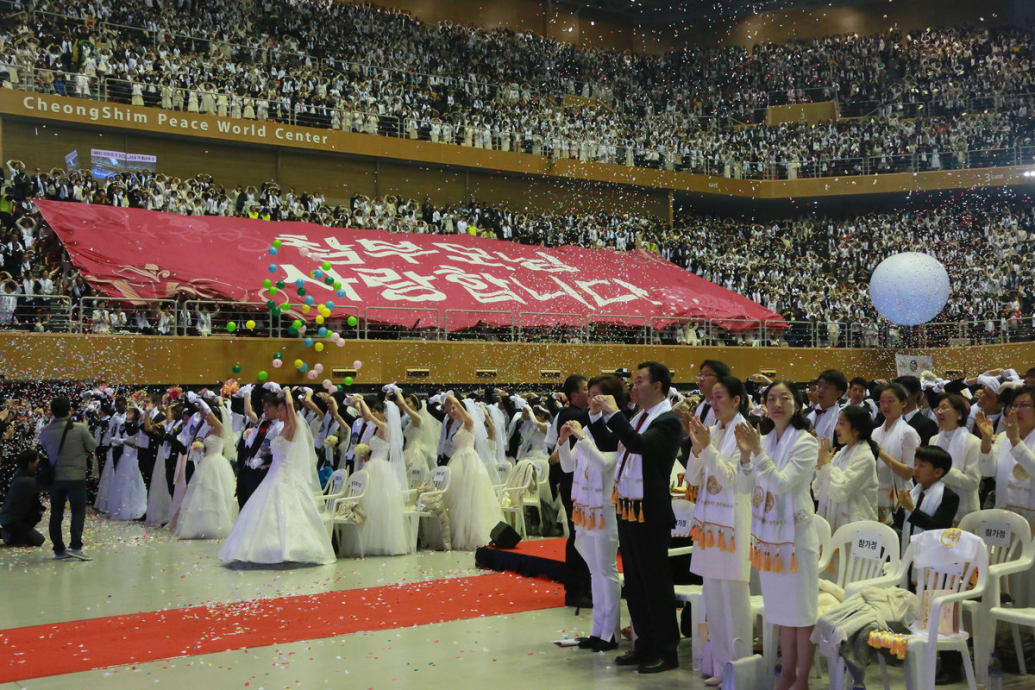
Couples from around the world participate in a mass wedding ceremony at the CheongShim Peace World Center in Gapyeong, South Korea.
NurPhoto via Getty Images
The Unification Church of Japan has publicly stated that Yamagami’s mother was a member but insists the days of soliciting donations in problematic ways are over. The Unification Church has made a point of distancing itself from the various entities under its control in Japan by changing its name under the Abe administration and setting up a number of seemingly unrelated think-tanks and nonprofit organizations that critics call “dummy companies.”
As the Network points out, the Unification Church’s expansion has been driven in part by its ties to politicians.
The grandfather of Shinzo Abe, Nobusuke Kishi, forged sharp alliances with the group. Kishi was arrested as a war criminal in 1945, but later released and put on the CIA payroll. He and notorious political fixer and yakuza associate Yoshio Kodama created the Liberal Democratic Party which has ruled Japan almost uninterrupted since the 1950s. Kishi later became prime minister. He was instrumental in the formation of the church’s political arm, the International Federation for Victory Over Communism, in the 1960s. Kishi and Moon became so close that when Moon was jailed for tax evasion in the United States, Kishi wrote to President Ronald Reagan asking for him to be released early.
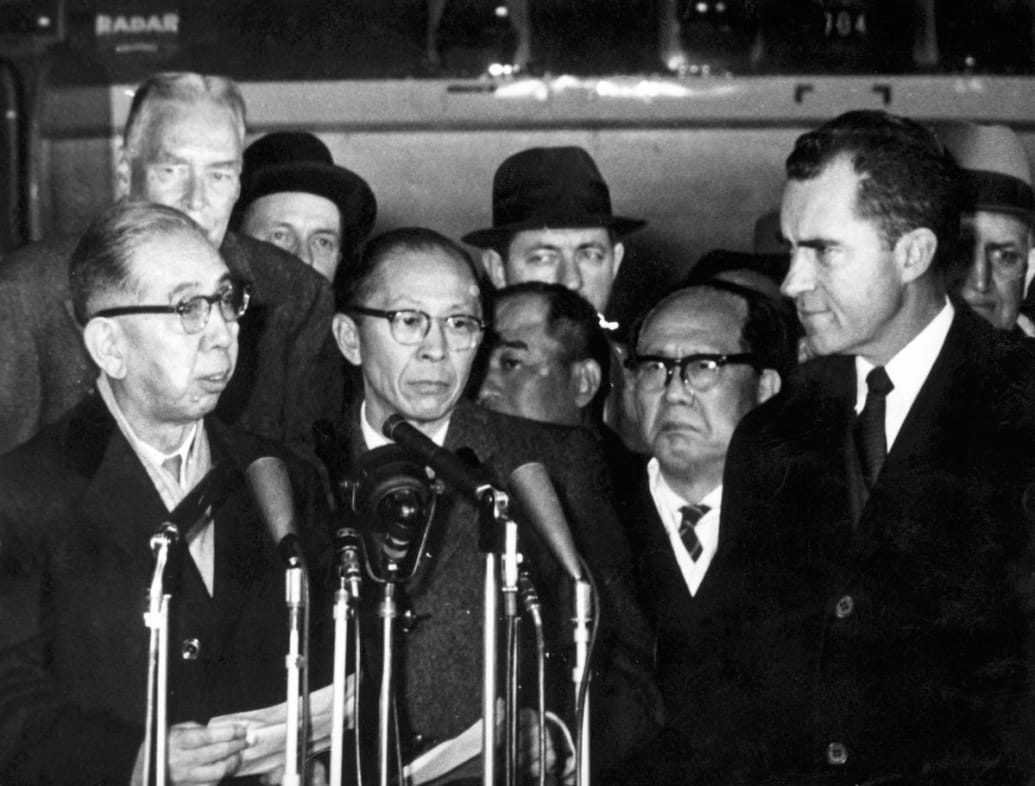
Japanese Prime Minister Nobusuke Kishi,left, and Richard Nixon In Washington, Jan. 20, 1960.
Keystone-France/Gamma-Keystone via Getty Images
Kishi’s son and Abe’s father, Shintaro Abe, maintained ties to the organization, and Shinzo Abe continued the practice—ignoring warnings that the group was causing huge social problems in Japan.
The National Network said they had repeatedly warned Abe to break ties with the church, pointing out that he had given credence to their “predatory and fraudulent activities.”
The ties between Abe and the group were not superficial. In 2005 and 2006, while a lawmaker, Abe sent congratulatory messages to events co-hosted by the Universal Peace Federation which has strong ties to the Unification Church.
According to materials from the National Network and public documents, in 2010 and 2012, Abe attended meetings of the Institute for Global Strategy, another allegedly church-affiliated organization. In 2011, he and other conservatives put out a one page opinion ad in the Washington Times denying Japanese war crimes. In 2013, under Abe, despite opposition within the Ministry of Cultural Affairs, the organization was allowed to change its name—thus obscuring its problematic past. In 2016, Abe invited the chairman of the Japan branch of the Unification Church to the prime minister’s residence. In September of 2021, Abe sent a video message to an event organized by the Universal Peace Federation. He praised the church's leaders and its “family values.” But Abe wasn’t alone, Donald Trump, Abe’s golf buddy and ideological pal, also sent a video praising the church's leaders.
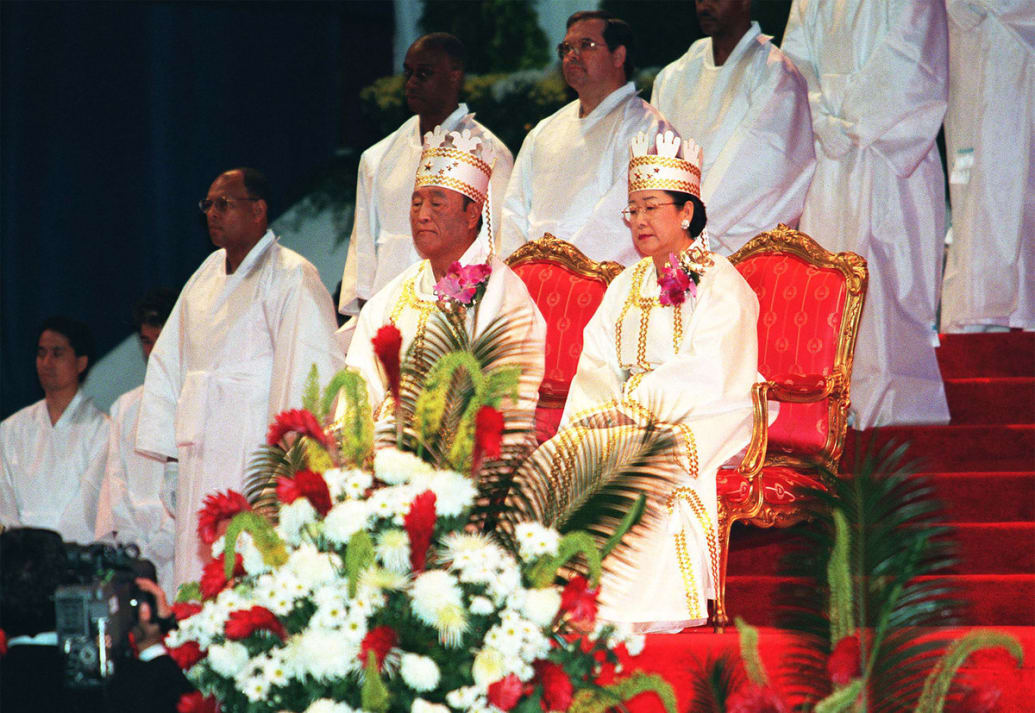
Reverend And Mrs. Sun Myung Moon Officiate The Family Federation For World Peace And Unification’s Blessing 98 Marriage Re-Dedication Ceremony And Wedding. Over 2,000 Couples Were Wedded At Madison Square Garden
Jeff Christensen/Getty Images
After Abe’s video message last September, the National Network again sent him a letter asking him to cease and desist supporting the church and its affiliated organizations. It was apparently ignored just as the 2006 letter was ignored. The gunman, however, did see the video.
Abe is not the only LDP member with friendly relations with the Unification Church. According to the evening newspaper Nikkan Gendai, the church long provided free labor and secretaries to members of the LDP, handling office work, policy, and day-to-day duties while ingratiating themselves with the party. In its July 23 edition, Gendai published a list of 35 members of Abe’s political faction with connections to the church. Other political parties have also cultivated strong ties with the church.
At the press conference on July 12, Lawyer Hiroshi Watanabe said, “To the victims of the Unification Church, it seems that the police didn’t properly investigate the group (on criminal charges of fraud and extortion) because they were well-connected to politicians. We feel the same way.”
Yoshifu Arita, a journalist and Japanese parliamentarian, said on a television broadcast aired July 18 that he was told by a senior police official, “The reason we didn’t crack down on this group [when we should have a decade ago] was the intervention of politicians.”
The Letter
In an interview published with Weekly Bunshun, the uncle of Yamagami describes in great detail how the involvement of the family with the church drove the family into poverty. Yamagami’s mother sold off the land and property her husband left her when he died, and donated a million dollars to the church. She was so involved in their activities, she was rarely home. Young Tetsuya would sometimes call, asking his uncle for food. The uncle would bring Tetsuya and his brother food and snacks, sometimes sushi. The mother donated all the money marked for his college education to the church. He joined the Self-Defense Forces to pay for school and became increasingly depressed. Yamagami took out a life insurance policy leaving his uncle and brother as the beneficiaries and tried to kill himself while still in the service.
Yamagami sent a letter days before attacking Abe, to a blog writer who had often written exposés of the Unification Church. It explains his state of mind.
I [once] wrote to you that I “want a gun so bad that a hand might as well come out of my throat to reach for one.” Since then and now, I have devoted myself to procuring a gun. My devotion resembled that of the Unification Church followers who discard all but their entire life in the name of a false God…
My fateful encounter with the Unification Church goes back about 30 years. My mother, since having entered the religion, wasted over a hundred million yen, our family’s collapse, bankruptcy... As such things went by, my teenage years were over. It wouldn’t be an exaggeration to say that this experience continued to distort the rest of my entire life.
While I did loathe Abe, he is not the primary enemy. He is no more than one sympathizer of the Unification Church, one who has great influence in the real world.
Yamagami told the Nara police that he was ready to die in his assassination attempt and that the entire purpose of the attack was to bring attention to the misdeeds of the church.
Unholy Alliances
That has certainly happened. The Japanese public and the media are taking a hard look at the relationships between the Liberal Democratic Party and fringe religions. Already bookstores are packed with books about the Unification Church and magazines are running cover stories. On television news programs, the links to Abe, the LDP, and the church are being examined.
Professor Koichi Nakano at Sophia University, an authority on Japanese politics, notes that the LDP has gotten into bed with many other extremist religious groups since the 1990s.
He notes: “About the Yamagami letter, I also think that it shows that he fully knows what he is doing. He did not kill Abe for his politics, but because he identified Abe as one of [the Unification Church’s] most powerful patrons. So the heinous act was committed in an attempt to take his revenge on the church. He targeted Abe, if anything, in spite of his politics.”
For some, the unholy alliance between the LDP and a ‘cult’ that sucks its members dry doesn’t make sense. But there are historical and practical reasons for the marriage.
Nakano explains,”In the early postwar era, it was anti-communism that brought together such religions as the Unification Church with the Japanese right-wing politicians. On the side of the new religions, the appearance of powerful conservative politicians in their events and publications provided a source of authority and credibility, and with deeper ties, even access to favorable government dispensations. The LDP politicians, in turn, gained not only organized votes but also campaign staff and secretaries, which were particularly appreciated by faction bosses who were looking to increase their inexperienced and under-resourced underlings fast.”
Abe’s regime was very close to the religious cult Nippon Kaigi.
It has a long history. In 1995 a variety of ultraconservative religions, including the Association of Shinto Shrines, which has always longed to reclaim its special status in prewar State Shintoism, formed the notorious Nippon Kaigi together with right-wing business and media leaders. It promoted reactionary nationalism that espoused reverence for the emperor, changing the constitution, remilitarization, historical revisionism, and traditional gender roles and family values. The world view of the Christianity-based Unification Church and Nippon Kaigi are not far apart.
For many years, the increasingly well-known alliance between the LDP and Nippon Kaigi, as well as its hidden alliance with the Unification Church, have served it well, but the assassination of Abe has had unexpected blowback. The echoes of those two gunshots will be heard in Japan for many years to come. For current Prime Minister Fumio Kishida (LDP) the growing voices of dissent and calls for an investigation into ties between his party and the Unification Church—as well as other extremist religious groups—are a present-day headache.
Last week, the journalist and television announcer Masaki Kusakabe delivered a harsh message for Japan’s politicians toward the end of a special feature examining the history of the Unification Church.
Speaking with a video image of Abe addressing a Unification Church-related gathering behind him, he said: “The Unification Church is a money-sucking group that can’t stand without donations from Japan. It is ill-advised for a politician to consort with them. Even more, they should bear in mind that sending messages and greetings may endorse the ideals and activities of the organization.”
Much of Japan heard that sermon and said, “Amen.”
No comments:
Post a Comment